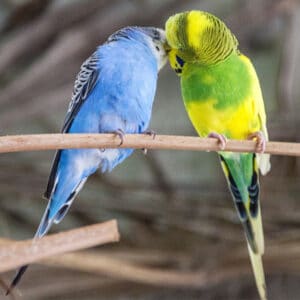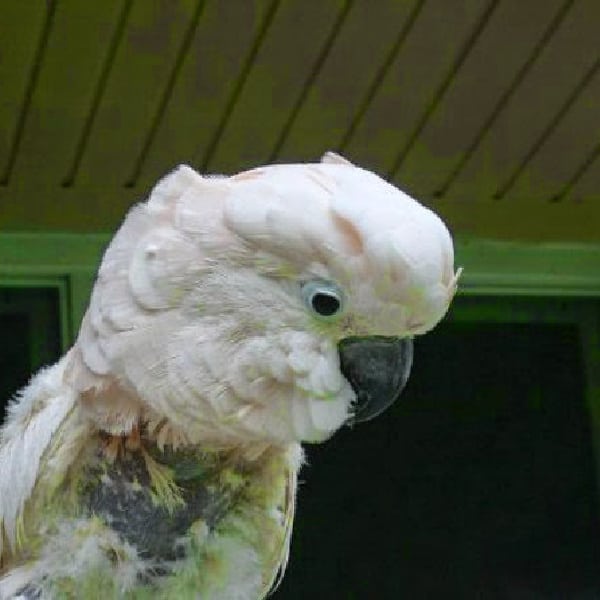
Moluccan_Cockatoo-feather_plucking-blog-1
Have We Finally Found a Cure for Feather Plucking?
Last Updated on by Mitch Rezman
From Facebook fan last night
“I’ve got a Catalina macaw that has a problem of plucking, I took her to the vet, she has a clean bill of health, now if anyone can help with the feather plucking problem, I would appreciate it , Thanks.”
From a customer on the West Coast during a phone call this week
“My 14-year-old lovebird began to pluck for no reason at all. We have him on the best foods we can provide like Harrison’s pellets but we had to put a collar on her to stop the feather loss. Nothing has changed in her life and she is fully flighted”
From a Facebook fan in South Africa earlier this week
“Hello, I need help, please. I get an African Grey Parrot as a gift, but he/she plucks his feathers. I give him stuff to put in his water for stress and pluck it’s feathers. What can I do, please I need help. Thank you.”
Rule number one
Plucking is a slippery slope. Regardless of the trigger it can be very difficult to stop. This defines frustration. It’s heartbreaking but in most cases it can be solved. It’s difficult for me to offer a course of action that reduces or eliminates feather plucking based upon a paragraph or two of input about the bird so for now I’d like to focus on triggers. There are other triggers but these are a good start.
Nutrition
What you feed your bird will have a huge impact on their overall well-being (stating) the obvious. The subject is too broad to get into details here but one of the things we are learning is that citrus fruit may be a feather plucking trigger. For a refresher course on your birds digestive system and an expanded explanation of the relationship between citrus and plucking, read this blog post.
No time to stray? Here’s the skinny. When a bird eats, food flows into its crop (which is up by its chest) and stays there for up to six hours before moving into the first stomach. Birds don’t have an acid-based homeostasis buffering system like humans, so with a few chunks of a Florida orange sitting in their crop, isn’t it possible your bird may develop what we humans call heartburn – in their chest area? Is this one way a seemingly well-nourished bird begins to pluck at its chest feathers?
Few or no foraging opportunities
In the wild your bird can spend 3 to 5 hours a day searching for food. At home something is always waiting in the dish that is easily accessible.
What else are these birds doing with the intelligence of a two-year-old child while you’re at work and they are alone all day?
These are animals that have rational thoughts and can reason including being able to pre-plan events into the future. Boredom is the number one trigger of plucking.
To this you say, hey I love my bird and I give my bird all the toys he or she wants. I put a new toy in the cage every week!
This begs the question – when you introduce the new toy do you rearrange all of the toys so the bird is pleasantly distracted and now has something to do (while you’re at work all day) or did you just add one new toy that your bird is now obsessing over? The law of unintended consequences at work. Obsession leads to stress which leads to plucking.
Foot health
Is your bird sleeping on an abrasive perch? Over a period of 30 years, a bird will spend more than 100,000 hours on its sleeping perch. A soft rope perch relieves foot stress and gives the bird something to pluck it other than feathers. More information on soft perches can be found here.
It’s important to have at the very least, three different textures of perches so your bird’s feet are always being challenged. They are on their feet 24/7, this is a very important cage provision to check that you have these. For more details, please read this blog post on perches.
Windows
A birdcage should always be placed against at least one wall to help provide a feeling of security. Placing a birdcage facing a large picture window can help provide your bird with both entertainment and be a pleasant distraction but before doing so we suggest that you spend some time looking out of that window to ensure that raptors aren’t soaring or migrating through the area. You bird has great eyesight and does not understand the concept of glass. The site of a distant bird of prey can be quite stressful and could lead to plucking
Lack of privacy
Parrots are prey animals and their existence in the wild is based on the 60/40 rule. 60% of the time they are searching for food and 40% of the time they’re trying not to be food. When your bird is in its cage it wants to feel as comfortable as you do when you close the window blinds, and pulled the covers over your shoulders and fall asleep.
You want your bird to feel comfortable and secure in its cage. You should have so many toys the top third of your cage you can barely see the bird. This will provide areas your bird can hide behind thereby giving them a sense of security. Read more on the bird cage privacy canopy here.
Another privacy issue, does your plucking bird feel threatened by other birds or animals in the house? Birds are flock animals instinctively anticipating certain group behaviors. If your cat, two dogs, and your ferret don’t interact like a flock of Sulfur Crested Cockatoos milling about in a grassy area, your bird may be stressed out by the dynamics of all of those relationships, which may need to be examined. As an example, your bird might feel fine in the upper portion of its cage with your cat on the floor but if your cat moves above the birds head, your bird might be instinctively anticipating a potential attack.
Flight
Flighted birds are healthier birds. There are lots of well-adjusted birds with clipped wings but from the birds point of view it’s quite an unnatural feeling. They can feel off-balance while walking, lacking the ability to have 100% of their balance using their wings.
The rough edges on the remainder of the largest feathers on their body after being clipped can be an irritant and may lead to plucking.
A flighted bird is a confident bird. A bird who has lost the ability to fly may feel threatened (unable to escape danger like another animal in the house) which could be a stress trigger.
Sleep
A sleep-deprived bird is a stressed bird. A bird kept up late at night because of a loud TV is not a happy bird. If birds don’t get 10 or 12 hours of undisturbed sleep each night they can get grumpy which leads to stress. Make sure you cover the cage nightly.
The dynamics of other birds and pets in the household
The recent introduction of a new bird might make an older bird jealous, they can be pretty obvious but the interaction of your bird with your cat, two dogs and a ferret might be a little more complicated. Your bird might be very comfortable with your cat lurking about on the floor but if your cat were to jump to a place that puts the cat in a position that’s higher than your bird, this could be stressful an example. You want to examine the dynamics of the relationship between your bird and other animals.
Speaking of relationships
Changes in the attitude of the human flock within the household can negatively impact a bird. Humans arguing can be stressful. Divorce has sent way too many birds into rescues. The addition of a new baby or an elderly relative who comes to live can all trigger stress-related plucking.
Airflow
If the cage is in the path of any drafts, even a slight bit of cold breeze that they cannot avoid can stress out a bird, summer or winter. Airborne mold spores from humidifiers can also lead to respiratory distress.
Dry heat
The same dry air that you and I experienced during the winter when our furnace is running is shared by our birds. We have to make sure their feathers get wet in the winter even more so than in the summer because of the drying effects of forced air heat, Dry air makes you and I scratch our dry skin and can lead to feather plucking for basically the same reasons.
Injury
Not all plucking triggers are emotional. A flighted bird that hits into a wall or window may appear to get up, shake itself off move on – once again a defense mechanism. A fragile chest made of hollow bones can bruise easily.
As one bird behaviorist posted in the thread about a bird who crashed into a wall the words were something like “get those birds wing clipped immediately because a flighted bird in your home is like a Ferrari on a basketball court” or something like that. “Sure lets chop off their feathers to ensure safety”.
Here’s a hypothetical – your bird lives and sleeps in the family room. You sleep in the upstairs bedroom. Is it possible you might not hear when your bird gets “night frights” late one night and your un-flighted, clipped bird falls off a perch falls onto the floor of the cage or flaps its truncated wings furiously sending it into the wall of the cage in the darkness?? Now your bird may have an injury you know nothing about – which becomes a plucking trigger.
Speaking of Injuries
How often do you examine your bird?. Let me guess your bird will not let you hold or towel him or her, and easily freaks out. So I’m guessing you’re going to wait until your bird does injure itself, or there’s a need to rapidly evacuate your home while you are frantically gathering family photos. which is when you’ll calmly & patiently teach your bird to accept the towel?
Another hypothetical
Not only do you not physically examine your bird regularly you don’t examine all of the toys and accessories very often. So a small shard from a cracked piece of wood on a bird toy poked your bird, but you didn’t know it until you see your bird plucking in the area of the injury.
Sexual frustration
Humans clip off wing feathers, place bird in cages isolated from other birds which denies your bird the instinctive natural urge to mate or bond. Once again a possible stress trigger. Here’s possible solution.
Do you know how many times we’ve heard something like “I thought my bird was a male for the past 11 years until she laid 3 eggs yesterday”. Your bird may be hormonal and developing eggs. Carrying eggs (a male bird is not necessary for egg production) can be stressful physically and emotionally.
This is one of the reasons that we stress to have your bird sexed. Doesn’t it earlier than they instinctively expect. make sense to know if your bird is a female or not so you can watch for signs of brooding?. An egg-bound bird (with a body that won’t release the eggs) can make a bird go from healthy to dead in a short time.
The egg-laying cycle especially in an unnatural environment like a birdcage can be stressful and may lead to plucking.
Winter and changing light cycles
North America just confounds birds what with things like winter and darkness coming hours earlier than they instinctively expect. One more stress trigger Read more about that here
Illness
How do you know if your bird is actually sick? The only accurate way to do this by weighing your bird regularly, preferably on a weekly basis with a digital scale.
By maintaining a simple log, rapid swings and weight gain can indicate illness or may be developing eggs. Illnesses are stressful and may trigger plucking.
If you have you bird 30 years, for the cost of $2.00 a year or so a good digital scale will more than pay for itself –
New water bottle
You want to eliminate poop soup so you introduce a new water bottle, problem solved! What if the water bottle scares the dickens of your bird. It might not show it, but just be stressed and begins to pluck.
New stuff in general
The list is endless, what is benign to you and me can send shivers down the spine of your bird. A new hat that you hang up on the coat rack. A new picture on the wall across from the birdcage. A new piece of furniture or the rearrangement of furniture. A new throw rug in front of the cage. It’s important to watch for reaction to these small but important change in your bird’s life.
Any of these things can trigger stress-related feather plucking. This post has been a good place to start. There is no one cure, there is no one trigger – but I hope the identification of some of these triggers will help with your detective work.
Although not a panacea we are getting rave reviews about a product called Avicalm. You can find more about AviCalm here. BTW there are no ornithological records of parrots plucking in the wild.
Author Profile
Latest entries
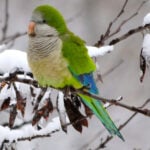 The Traveling BirdJune 26, 2025Can You Name 5 Parrot Species That Are Living Wild in the USA?
The Traveling BirdJune 26, 2025Can You Name 5 Parrot Species That Are Living Wild in the USA?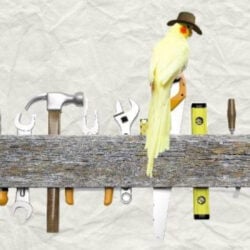 Bird BehaviorJune 26, 2025How is it Parrots Are Problem Solvers Social Animals and Even Use Tools?
Bird BehaviorJune 26, 2025How is it Parrots Are Problem Solvers Social Animals and Even Use Tools?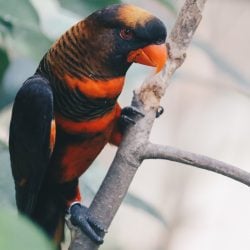 Bird & Parrot AnatomyJune 25, 2025How a Tiny Chemical Modification Makes Parrots Nature’s Living Paintings
Bird & Parrot AnatomyJune 25, 2025How a Tiny Chemical Modification Makes Parrots Nature’s Living Paintings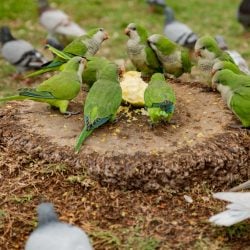 PigeonsJune 20, 2025How Do Parrots Thrive in Cities Outside Their Native Habitats?
PigeonsJune 20, 2025How Do Parrots Thrive in Cities Outside Their Native Habitats?

